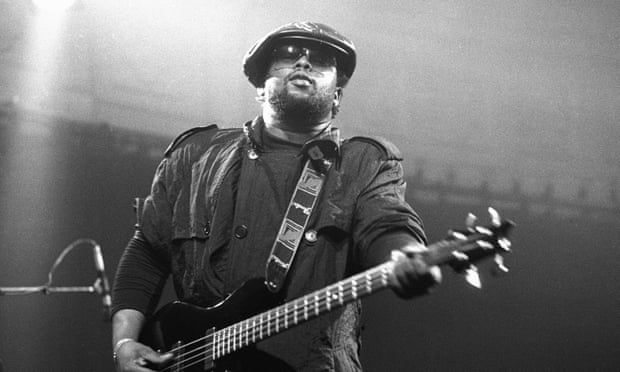
Robbie Shakespeare, RIP
1953-2021
by Generoso Fierro
On Tuesday, December 8, the Honorable Olivia Grange, Minister of Jamaica’s Ministry of Culture, Gender, Entertainment & Sport, announced that the great Robbie Shakespeare had left us at the age of 68. Minister Grange wrote the following about her friend Robbie and his longtime rhythm partner and co-producer, Sly Dunbar:
“This fantastic team took bass playing and drumming to the highest level as they made music for themselves as a group and for many other artists locally and internationally.”
Personally, as someone who has done a Jamaican music radio show these last twenty-five years, I still haven’t fully processed Robbie’s passing yet. His work, both as an instrumentalist and a producer, was beyond crucial to the eras of music that my wife and radio partner, Lily, concentrate on with our show. Candidly, unless we are focusing on a period of time before he began his career, it is hard to remember a show where Robbie didn’t have his presence somewhere in it. In writing this memorial, I could spend days just listing the iconic tracks that Robbie had a hand in during his over five-decades-long career. Simply put, Robbie Shakespeare was essential to the development of Jamaican music. He was constantly in demand. He was prolific, and his work was always impeccable.
Over the years on our radio program, we have highlighted a few of the labels that Shakespeare helmed, and in 2018, we took a close look at his earliest imprint, the short-lived Bar Bell label. As Robbie ran the label so early in his career, we took the opportunity of putting together that spotlight to examine his origins in music.
Born in East Kingston, Robert Warren Dale Shakespeare was introduced to the music industry early because his brother Lloyd was a member of The Emotions, the massively underrated vocal group that featured a young Max Romeo. Originally, Robbie, who started on the guitar, would hang out and strum along with brother’s band during rehearsals. In addition to his experience of being around The Emotions, Robbie carried and set up Carlton Barrett’s drums in recording studios, and though he was not allowed to stay in the studio during sessions, he did manage to get glimpses of the recording process. So, given that he was often around the studio, Robbie got to see Carlton Barrett’s brother, Aston “Family Man” Barrett, play bass, which furthered Robbie’s love for the instrument. One day, Robbie asked Aston to teach him the bass, and thankfully, Aston agreed.
Robbie would excel on bass, and subsequently, when Family Man became too busy to continue as a member of the legendary backing group the Hippy Boys in the late sixties, Shakespeare was brought in to replace him in the studio and at live concerts. After years of recording for everyone from Sonia Pottinger to Lee Scratch Perry to Joe Gibbs, Shakespeare opened up his first record label, Bar Bell, in 1975. While the label primarily consists of Robbie Shakespeare’s own productions, there are also tracks co-produced by the late Bunny Lee. In fact, it was Lee who was key in cementing Sly & Robbie’s partnership. As a member of the Aggrovators, Shakespeare saw Skin, Flesh, and Bones perform at Dickie Wong’s Tit For Tat club on Redhills Road in Kingston in 1973, and upon seeing Sly’s talents as a member of the group, he was impressed. When in the studio with Bunny Lee, Shakespeare asked Lee if they could try Sly out on drums for a session. Lee said yes, and Sly and Robbie began collaborating, and the rest is history.
By the mid-1970s, Sly and Robbie would regularly jam together as members of The Revolutionaries, the house band for “Jo Jo” Hoo Kim’s Channel One studios. While working for Hoo Kim, Sly and Robbie would provide fantastic riddims in the rockers style on many of the finest recordings of that era, such as The Mighty Diamonds’ When the Right Time Come, Clint Eastwood’s Death in the Arena, and Leroy Smart’s Ballistic Affair. Also, during this time, the duo formed their seminal label, Taxi, where they produced and accompanied reggae legends Dennis Brown, Jimmy Riley, and Gregory Issacs on a plethora of classics. Sly and Robbie were also brilliant behind Peter Tosh on several of his albums that were released through Tosh’s own Intel Diplo label, but it was their long and highly successful collaboration with Black Uhuru that really helped create an overwhelming demand for their unique expertise worldwide.
Over the course of their storied career, Sly and Robbie laid down chops for Grace Jones, Mick Jagger, Bob Dylan, Serge Gainsbourg, and Madonna, making the duo one of the most, if not the most, coveted rhythm sections across multiple generations, and adding to his list of accolades, Robbie Shakespeare was nominated for 13 Grammys in his career and won twice. He would remain close friends with Sly, and the duo continued to masterfully innovate and redefine reggae music everywhere they went, and for that, we are all eternally grateful.
Rest in power, Robbie. Thank you.
Featured image: Courtesy of Frans Schellekens/Redferns












